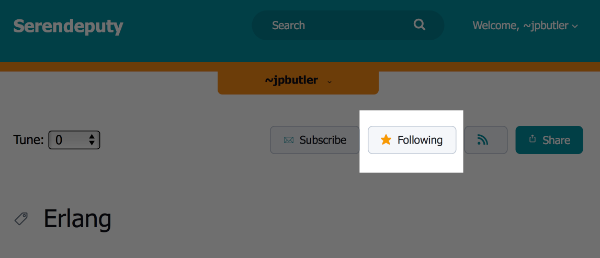How Serendeputy Works
When you sign up, you will create a "deputy" — an intelligent software agent that works on your behalf to create your personal newsfeed engine. Think of your deputy as a smart little person who works for you.
Your deputy works with our librarian, a program that reads and indexes the current open web.
Your deputy will pay attention to all the tags, sites and feeds you follow, and the librarian will send over links matching those tags.
Your deputy will then sort and prioritize these links for you. If an article hits many of the tags you follow, it's going to float to the top of your homepage for you.
Your deputy will provide you your feed however you like it: on the open web, via daily emails or via RSS feeds. Every page your deputy creates is available in all three open formats.
Follow tags to include more articles in your personal newsfeed
Serendeputy’s librarian indexes each article across 95,000,000 or so tags. Pretty much every English-language noun — every person, place, thing or concept — has its own tag. So does almost every active site and RSS feed. You can click the "Article Details" link for any article to see all its tags, including what feeds it came from, which sites have linked to it, etc.
You can follow however many tags you want. This will command your deputy to include those tags in your personal newsfeed.
Let's say you're a fan of the Erlang programming language (as we all are!). You search and go to the Erlang tag page. This has all the current open-web articles about Erlang.
You can follow the Erlang tag by clicking the star.

Your deputy will then include all the Erlang documents in your personal newsfeed, and will highlight why they are interesting for you.

You can see all the tags you are following on your “following” page. You can unfollow tags when you’re done with them (or if they’re too noisy).
Tune your deputy to make it smarter
You can tune the deputy as well. If you want to score New England Patriots articles really high, give them a +100 score. If you want to bury articles about the New York Jets, you can give them a -100 score.

If you want daily email alerts on a specific tag, just click the envelope icon. You will get the alert each day with new articles for that tag, organized by your deputy.

How does your deputy score articles for you?
Three R's. Relevance, Reputation and Recency.
Relevance is your deputy calculating how relevant this particular article is to you, personally. This is a function of what tags you’ve bookmarked and how you’ve tuned things. Your deputy is also — as you’d expect — doing some machine learning in the background to improve what you see, but your explicit commands carry more weight.
Reputation is a basic index score that shows how popular this article in the greater world of the current open web. You can imagine that the "reputation score" is a function of how many people (in the world, not just those accounts you follow) are linking to an article, how many sites are linking to it, how many people are clicking on it, etc. This is a metric just for the document itself, and is independent of how relevant it is for you personally.
Recency is an index score based on how long it's been since the librarian found this document. Your deputy will give higher priority to more recent documents. (For the math geeks among us: it's an exponential decay function).
How does your deputy organize links for you?
Your deputy will then "merchandise" your feed for you. This means that it will try to give you some variety in what it's showing you. It could be that the top four articles for you right now are all on the same basic topic; rather than be redundant, your deputy will then move articles up and down the list a little bit to give you more of a sampling.
Once you click on an article (or skip it by clicking the "x"), your deputy will remove it from what it shows you.
How do I get started?
While Twitter is figuring out their API strategy, I'm holding off on new registrations. I hope to open up again soon!
Ok, that’s the high-level summary of how things work. If you want to see what a fully fleshed-out deputy looks like, you can check out my personal deputy. If you have any more questions, check out the customer forum on Reddit or just drop me a line at jason@serendeputy.com.